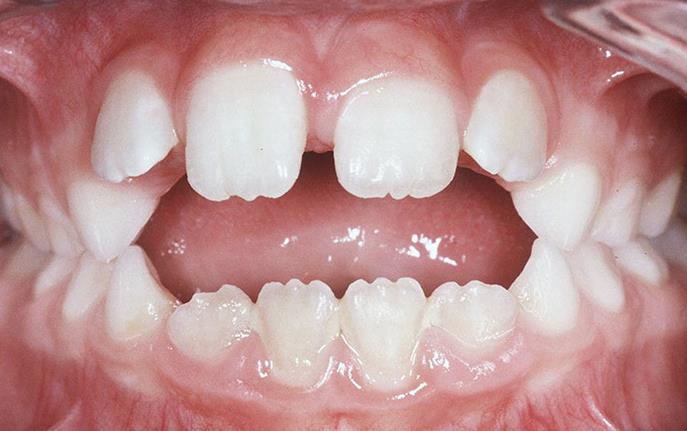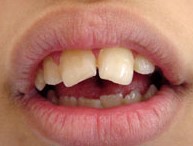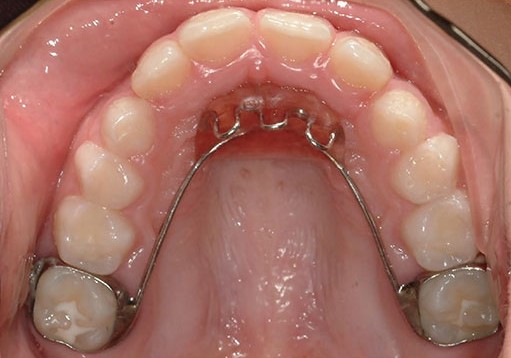What is sucking habit?
It is the habit that develops when a child sucks his or her thumb, digits or objects day/night.

How common are these habits?
This is a natural reflex for a baby that may start in-utero and is normal during a child’s developmental period. Some children however (aged 7-11) develop a prolonged digit sucking habit. Girls are more likely to indulge in this habit more than boys. Dummy sucking however, rarely leads to a digit sucking habit, and is generally ceased by the age of 3 years.
However, if this sucking habit continues into the mixed dentition phase, past the age of 6 years, problems with position of teeth might occur due to undesirable tooth position.
Why has my child developed this habit?
Possible reasons could be:
- It provides comfort to the child
- It is a learned habit
Other factors such as length of breast feeding period, feeding upsets and psychological stress provides little or no significance in the development of this habit.
What problems can it cause?
Problems with teeth position results from a combination of direct pressure on the teeth from the thumb/digits and changes in the pressure on the teeth from the lips, cheeks, and tongue.
The common features are:
- Upper front teeth may stick/ protrude out
- Vertical gap between the upper teeth and lower teeth which is called an anterior open bite. This makes biting food using the front teeth difficult.
- Upper jaw may become narrow, causing the back teeth to meet at an odd position. This is called a posterior cross bite.
All this may interfere with biting and may interfere with speech and closing the lips.

Vertical gap between the upper front teeth and lower front teeth is called an anterior open bite


Upper front teeth may stick/ protrude out
The severity of these teeth and bite problems depends on:
- How often they suck their thumb/digits
- How hard they suck their thumb/digits
- When they stop this habit
If the child sucks his/her thumb/digits for more than 6 hours per day, it may cause teeth and bite problems.
What can we do to stop this habit?
The objective is to stop this habit by the age of 6-7 years. Some may stop this habit unaided but some may persist well into teenage years.
This habit is not easy to halt as the child enjoys it. It must be stopped during the day before it can be stop at night. Most importantly, the child must want to stop this habit!
These following methods can be tried:
- Gentle discouragement – children older than 6-7 years understand the concept of cause and effect. Explain to them the adverse effects of their habit and the benefits of stopping this habit. You may want to use a wall chart or daily reward system.
- Praise the child for making the effort to stop. Give daily encouragement
- Be positive, build their self-esteem. Avoid nagging, teasing punishing, or shaming.
- Explain to them that the habit is having an adverse effect on the teeth and bite, and that their teeth will benefit if the habit was stopped. Children older than 6 or 7 years are better able to understand the concept of “cause and effect”. They also have the capacity for self-control and may choose to end their habit.
- Use a physical barrier such as gloves, bandage. nail polish etc.
What changes happen s to teeth if the habit is stopped?
Position of teeth can self-correct with normal growth if the habit if stopped by the age of 7.
If the habit continues beyond the age of 7, the position of teeth is permanent and self-correction is less likely to occur.
The child will then require complex orthodontic treatment in the future. However, orthodontic treatment can only be implemented if habit has been completely stopped.
How can an orthodontist help?
Orthodontist can help by providing advice and information on sucking habit as well as provision of habit-breaker appliance to obstruct the habit and make it harder to continue the habit.

An example of a habit breaker appliance
Does sucking pacifiers cause the same effects as thumb sucking?
Pacifiers also can move baby teeth but causes fewer problems if habit is stopped before the age of 7 years old
Points to remember!
- Stop the habit as early as possible, it is harder to stop when habit is prolonged
- The effects are worse, the longer the habit lasts. Sooner it is stopped, the lesser the effects.
- Orthodontic treatment cannot be commenced till the habit is fully stopped
Reference
- Laura Mitchell. An Introduction to Orthodontics 4th Edition. 2013. Oxford University Press.
| Last Reviewed | : | 12 June 2018 |
| Writer | : | Dr. Malathi a/p Deva Tata |
| Accreditor | : | Dr. Ali Hussin bin Ibrahim |







